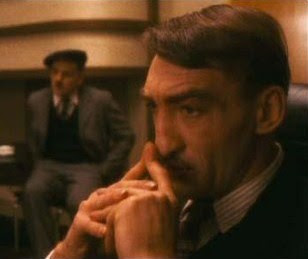In case anyone's balking at the thought of sitting down to watch a 15 hour movie, though, don't worry. It's neatly divided into 14 episodes, most of which are a manageable hour in length. Overall it tells the story of Franz Biberkopf, a jovial tubby chap trying to make ends meet in 1928 Berlin. He likes a drink, is a little eccentric at times and is a hit with the ladies. Oh, and he's also fresh out of prison for brutally beating his girlfriend to death — you could say he's fairly complex. He's played by Günter Lamprecht (who was also in Das Boot so he must have a thing for great 80s German TV series) and it's an astonishing performance in what is an incredibly difficult role. He's rarely off screen and has to convey such a disparate range of emotions, from good-natured joking around to intense and disturbing acts of violence. He philosophises about life and love and his place in the world; he sings and hums the tunes of the period; he drinks himself into oblivion; he talks to himself and, in one brilliantly bizarre scene, he talks to his pint of beer. It's a whole career of roles all crammed into a single performance.

Surrounding Biberkopf are dozens of supporting characters, some of whom emerge from the Berlin undergrowth for an episode or two and then slink back; others stick around longer. He has numerous women in his life and it's really fascinating to dissect what exactly they see in him — he is, after all, a charming and lovable bloke despite the somewhat darker side. His male friends include Meck, a dour but loyal chap who tries to keep Franz grounded in reality, and Reinhold with whom he develops a strange and complex relationship. Gottfried John (also a Bond villain) is equally brilliant as Reinhold and his central pairing with Lamprecht forms the backbone of the piece.
Rainer Werner Fassbinder, the director, is the genius behind it, though, and I can't begin to imagine how hard it must have been to put together. Twin Peaks springs to mind as being similarly complicated and ambitious, but David Lynch actually only directed half a dozen of the 30 episodes. Fassbinder was involved with every moment of Berlin Alexanderplatz and consequently it rarely rings a false note. For sure it can be quite tough going at times, especially for non-German speakers. It's very wordy and there are long passages of philosophical musings where the subtitles struggle to keep up. You do need to concentrate, but if you stick with it you're amply rewarded. For the most part it's played pretty straight, but it does veer off into more surreal territory on occasion, particularly in the final episode which is an extremely brave and clever way to finish it all off. The length actually isn't much of an issue, although you certainly won't want to watch it all in one go. It's still very tight and there's no flab and no redundant scenes that were added just for padding. I've not read Döblin's novel, but it does illustrate how hard it is to translate literature to the screen. If Fassbinder can get 15 hours of material out of a 430-page book, think how much must have been sacrificed when the film version of Anna Karenina condensed 850 pages into 95 minutes!

In some respects you could say that this is the greatest film ever made, but such a claim is pretty dubious because you're not comparing like for like. It gives itself so much time to explore its themes and immerse the audience in its world that it's bound to have the advantage over more conventional pieces. Citizen Kane, at number one, is not exactly a short film at 119 minutes but is still about an eighth the length of Berlin Alexanderplatz and, while I know which one enthralled and enlightened me more, something has to be said for efficiency of story-telling. It's a bit like comparing the novels À la recherche du temps perdu with Catch-22, the former conveniently about eight times longer than the latter. I'm sure Proust's work is the greater feat of literary achievement and more deeply explores the complexity of man, but Heller's is much funnier.
Personally I'd drop this from the list entirely, but if I had to include it I'd put it a lot higher than no. 62. Anyway, I'm now off to watch Shoah, which should be a walk in the park — it doesn't even reach the ten-hour mark!